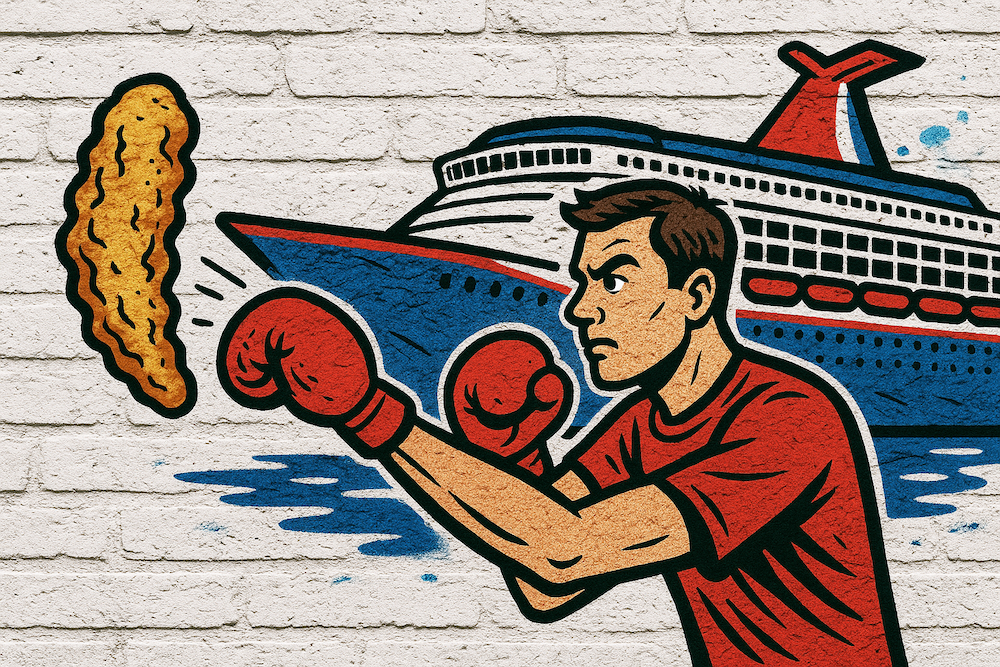If you spend even five minutes scrolling through cruise-related social media, it’s almost guaranteed: you’ll stumble across a video of a fight breaking out on a Carnival cruise ship. It’s become such a regular occurrence that people are beginning to associate the brand not with fun in the sun, but with viral brawls at sea. And while any floating city of thousands is bound to have its share of drama, Carnival just can’t seem to shake the headlines—or the memes.
The latest incident making the rounds is straight out of a parody skit. According to a report in the New York Post, a melee erupted on a Carnival ship sailing from Miami, apparently sparked by a dispute over—of all things—chicken tenders. Yes, chicken tenders. Video of the fight shows dozens of passengers shoving, punching, and yelling as security tries to break it up. The footage quickly spread online, adding yet another black eye to Carnival’s public image.
To be fair, Carnival isn’t the only cruise line that’s had to deal with unruly passengers. Earlier this year, a massive fight broke out on Royal Caribbean’s private island, Coco Cay, involving around 30 people. That video went viral too. But here’s the difference: Royal Caribbean seems to get one of these incidents every now and then. Carnival? It feels like every week there’s a new clip. The consistency of the bad press is the problem.

Why Carnival Gets the Spotlight
So why does Carnival keep getting dragged more than its competitors? Part of it is sheer size. Carnival Cruise Line is the world’s largest cruise operator, carrying millions of passengers each year. With more ships, more sailings, and more guests, the odds of something going wrong are naturally higher. Another factor is perception: Carnival has long marketed itself as the “Fun Ship” brand, with affordable fares and lively onboard atmospheres. For critics, that’s an easy stereotype to latch onto when videos of fights surface—painting the line as a booze-fueled free-for-all.
Social media doesn’t help. A single passenger posting a video of a scuffle can rack up millions of views before Carnival even has a chance to issue a statement. And let’s be honest—clips of people throwing punches on the Lido Deck are far more clickable than press releases about a new dining venue or itinerary.
What Carnival Actually Does to Prevent Fights
It’s not like Carnival is ignoring the issue. The cruise line has rolled out additional, very visible, security onboard, who are trained and intervene quickly when situations escalate. They also have alcohol policies in place: drink packages come with limits on how many beverages a guest can order in a short period, and bartenders are trained to cut off guests who appear intoxicated.
When fights do happen, Carnival takes action. Passengers involved are typically detained, removed from the ship at the next port, and banned from sailing again. In some cases, melees have even made their way to Carnival’s cruise terminals. One viral fight in Long Beach ended with participants being barred not just from the ship, but from Carnival’s facilities altogether. The cruise line makes it clear—get violent, and you’re done.
The challenge, though, is that these preventative measures don’t stop the videos from surfacing. The punishment happens after the fact, while the PR damage is immediate.
The C-Suite’s Nightmare
There’s no doubt Carnival executives are acutely aware of the optics. On one hand, they’re investing in exciting new projects designed to attract attention for the right reasons—like Celebration Key, their new private island destination in the Bahamas. On the other, every time they make a major announcement, it’s overshadowed by yet another viral brawl. It’s the corporate version of trying to redecorate your living room while someone sets off fireworks in your kitchen.
Potential cruisers, especially first-timers, see these videos and wonder: Is this what I’m signing up for? That hesitation is the last thing Carnival wants when competing with Royal Caribbean, MSC, and Norwegian for vacation dollars.
Can Carnival Turn This Around?
So, what can Carnival do to stem the tide of bad PR? For starters, doubling down on security visibility might help, which they’ve done. I have seen a much larger presence of security onboard over the past year that are stationed in all areas of the ship. Having security officers more prominently stationed in high-traffic areas—like pool decks and buffets—could serve as a deterrent. Proactive crowd management, especially during peak times like embarkation, sail-away parties, and late-night food service, could also cut off problems before they escalate.
Public messaging matters too. Instead of quietly handling incidents, Carnival might consider being more transparent when fights do occur. A firm, public statement after each viral video, emphasizing that offenders were banned and law enforcement was involved, could help counter the perception that the brand tolerates bad behavior.
There’s also room to rethink the onboard experience. Adding more late-night entertainment options, making sure food venues are adequately staffed, and spreading out crowd-heavy events might reduce the kind of tension that leads to “chicken tender brawls.”
Finally, Carnival needs to lean harder into positive PR. Celebration Key is a golden opportunity, but the rollout should be paired with aggressive storytelling about family experiences, world-class dining, and guest satisfaction. Flooding the news cycle with positivity won’t eliminate the fights—but it could help drown them out.
The Bottom Line
Every cruise line has its share of rowdy passengers, but Carnival has become the poster child for onboard chaos thanks to the relentless stream of viral fight videos. The truth is, most Carnival cruises sail without incident and out of all the times I’ve cruise with them, I’ve NEVER seen or heard of a fight breaking out. Millions of guests every year have safe, fun vacations without ever witnessing a brawl. But perception is powerful, and right now, Carnival’s perception problem is overshadowing its successes.
Until the company finds a way to control both passenger behavior and the narrative around it, Carnival risks being remembered less for its “Fun Ships” and more for its fight reels. And that’s not a vacation memory anyone wants to book.
